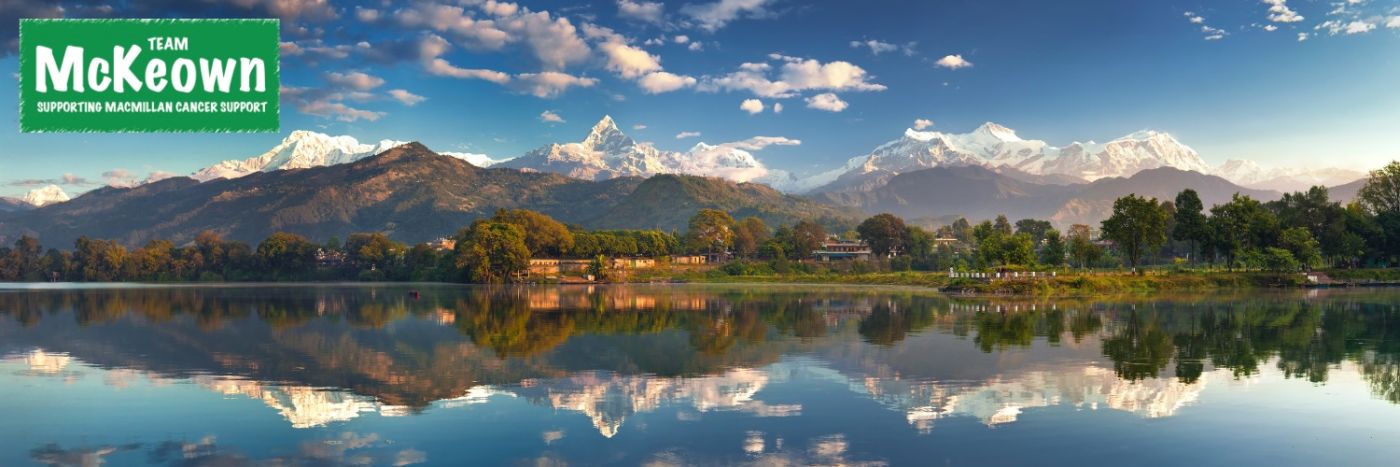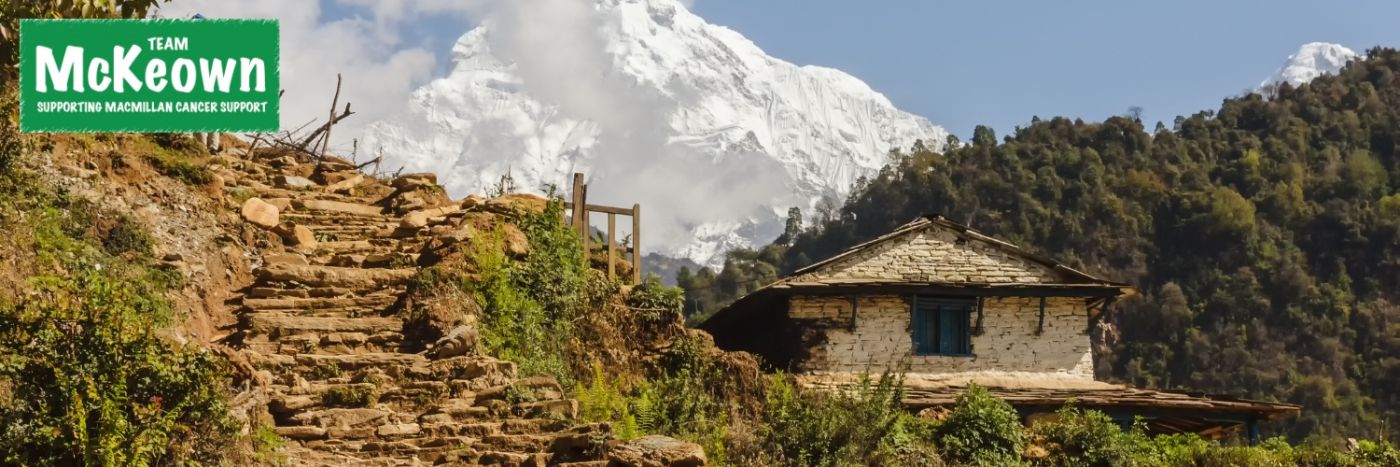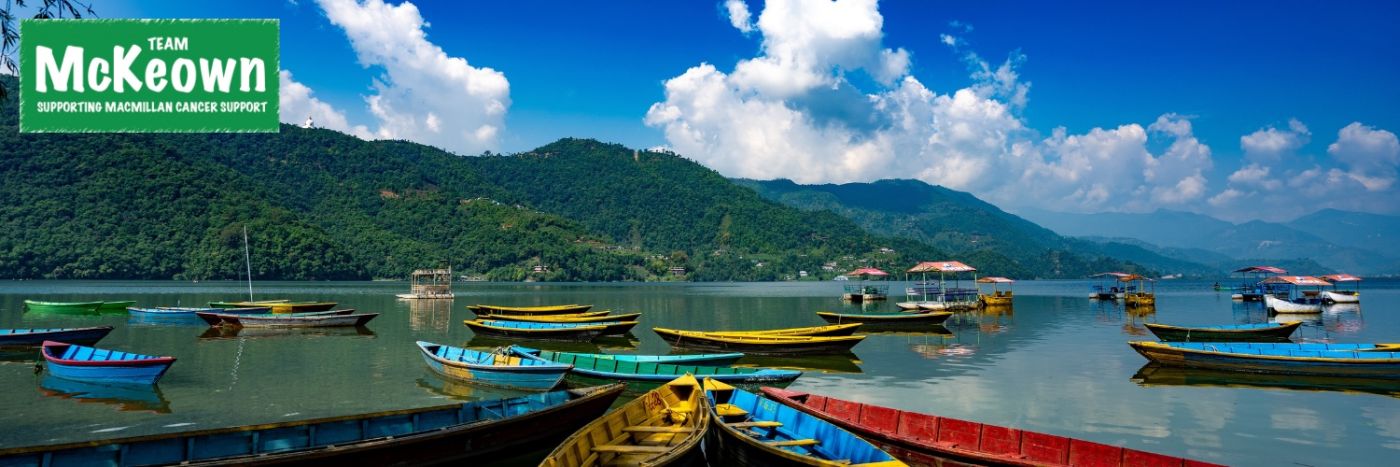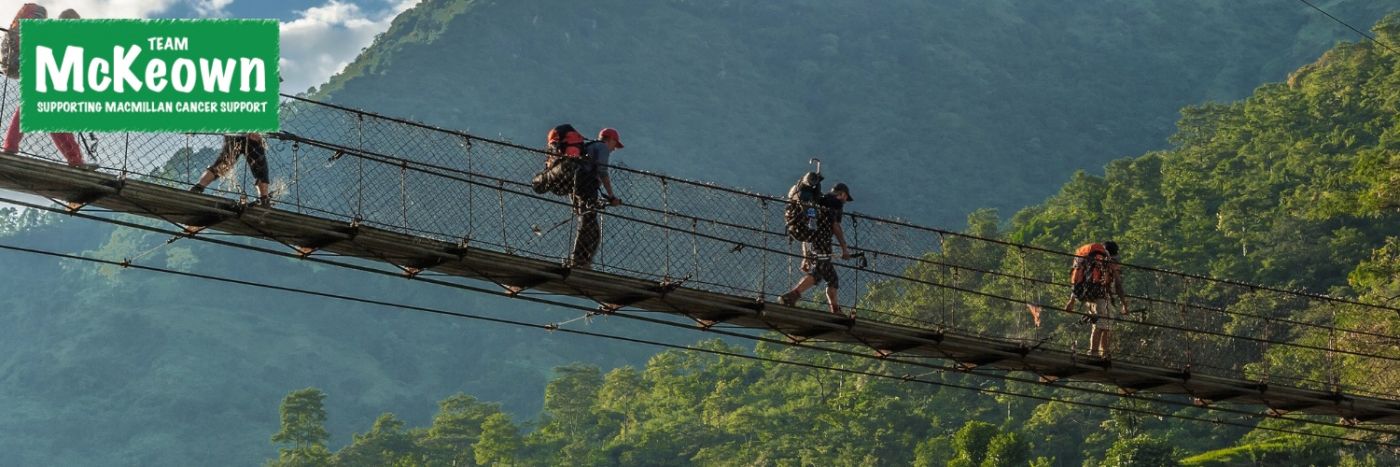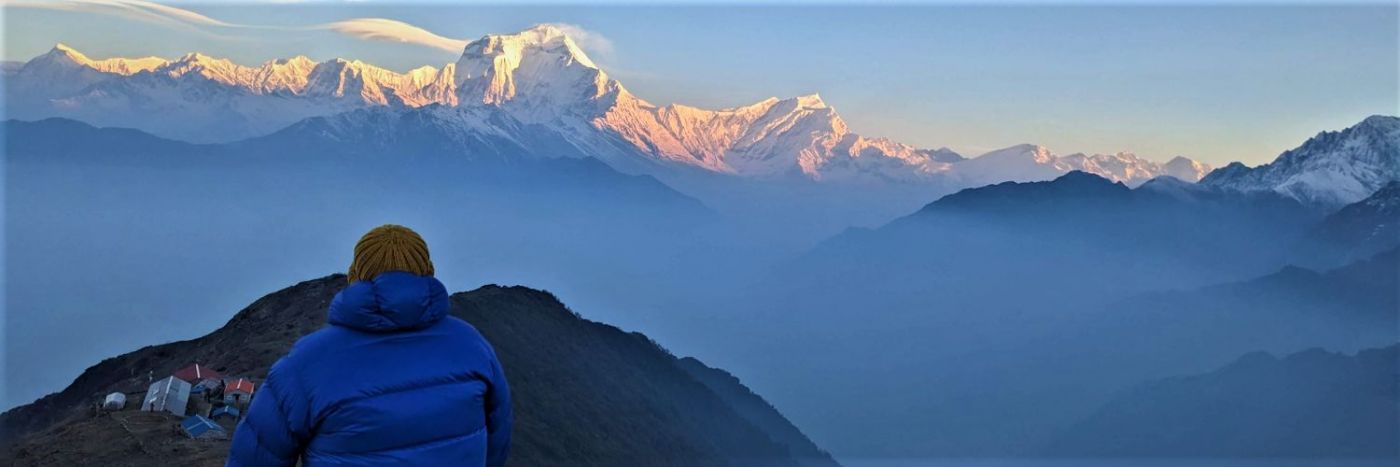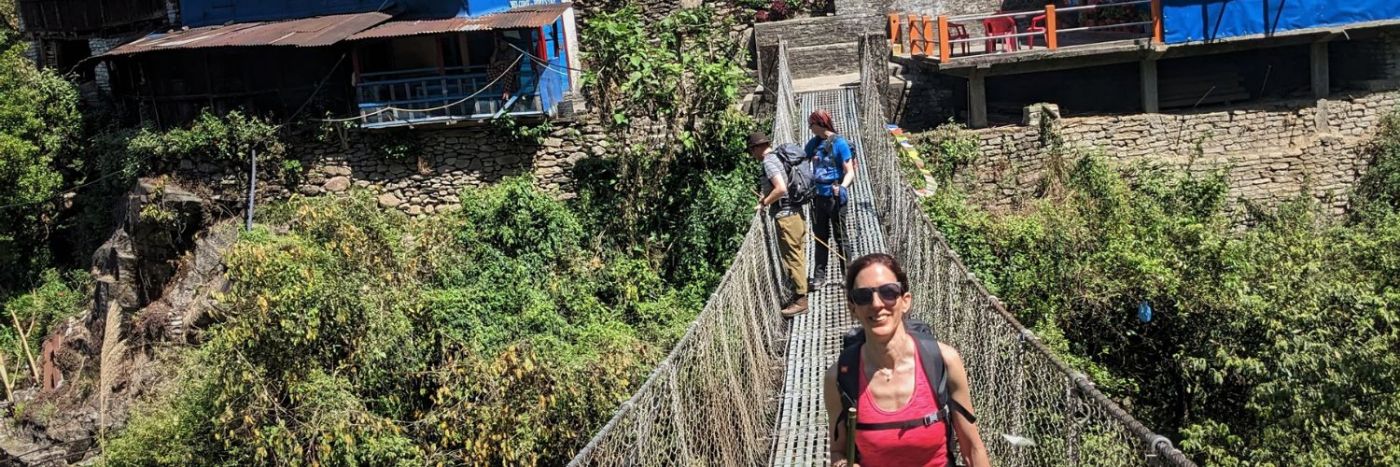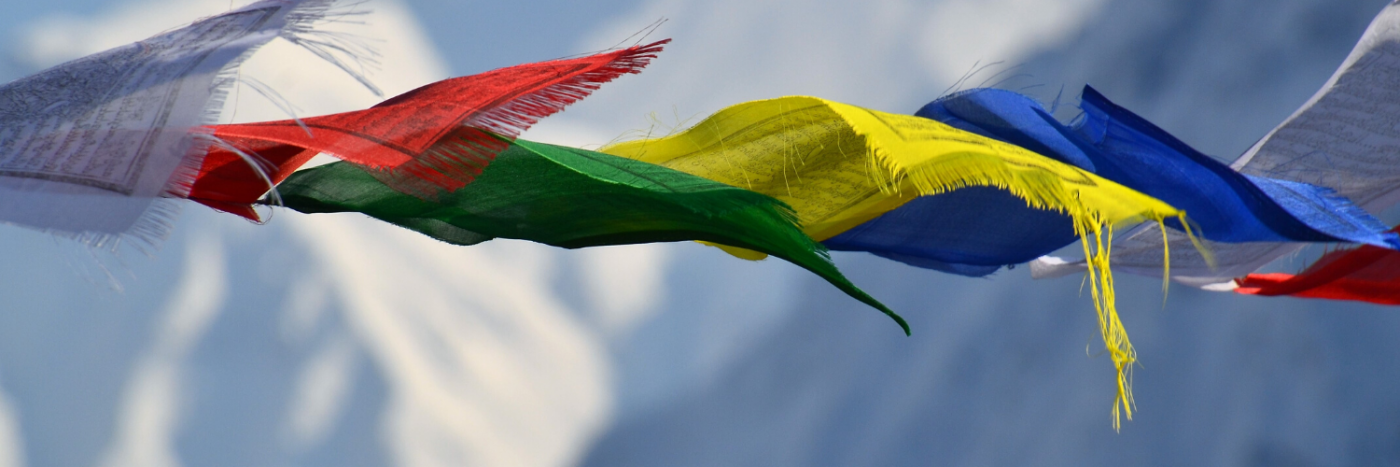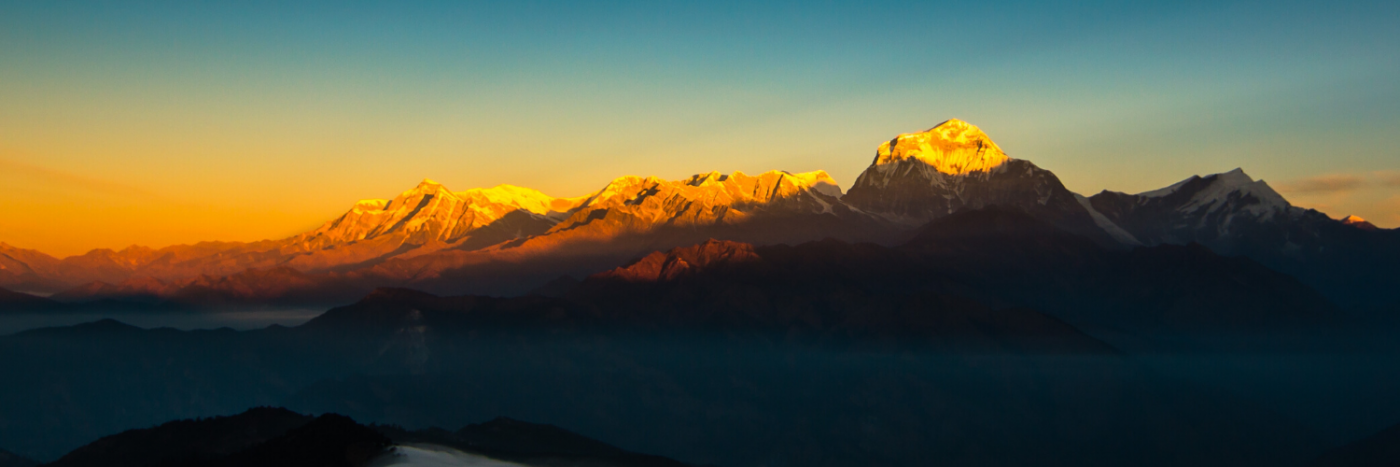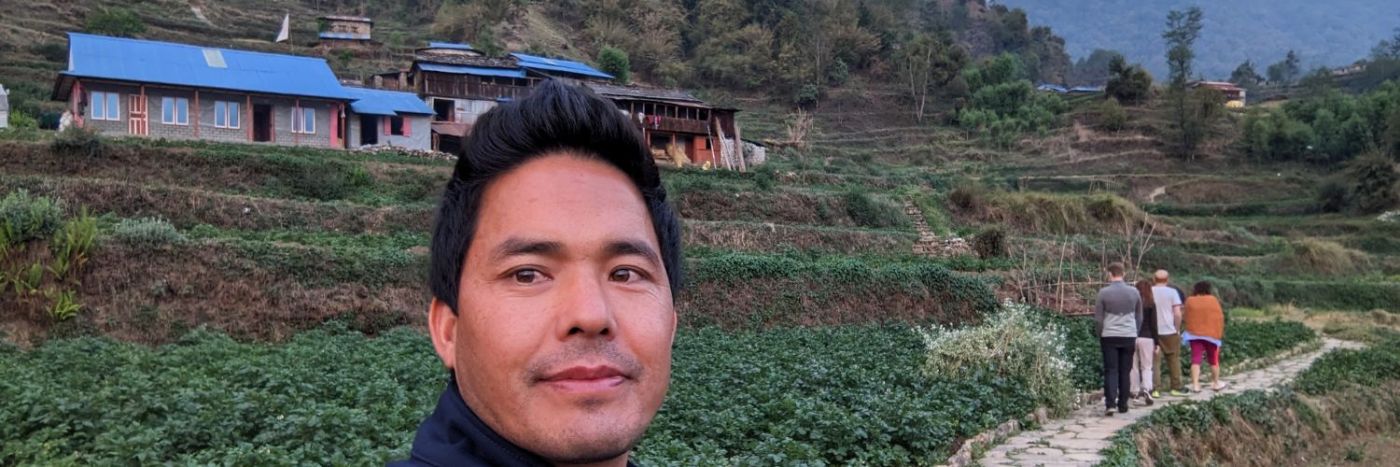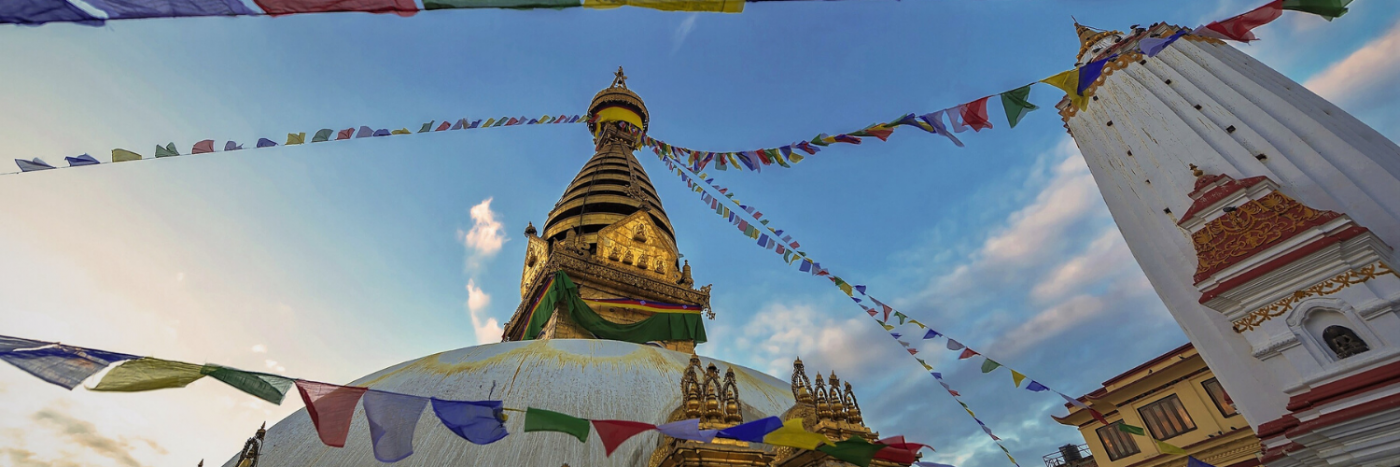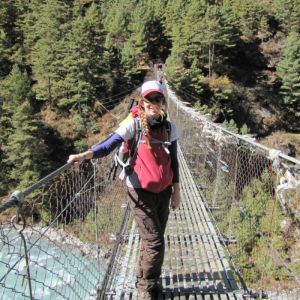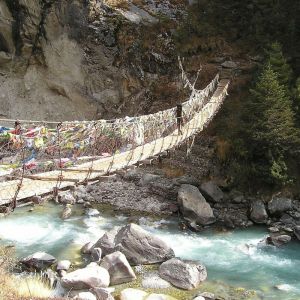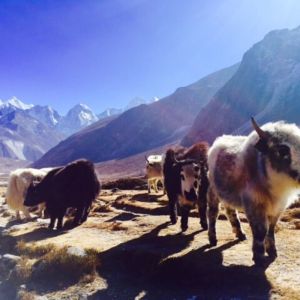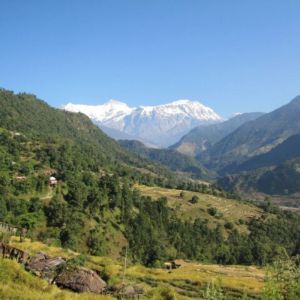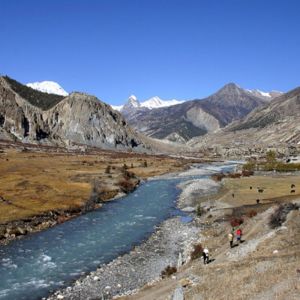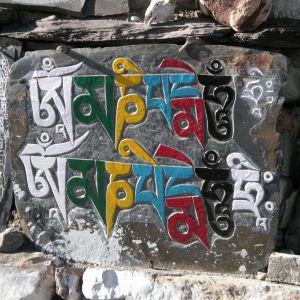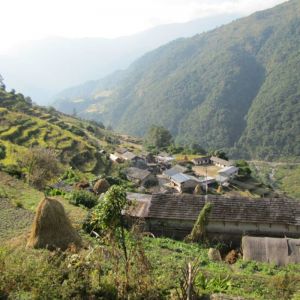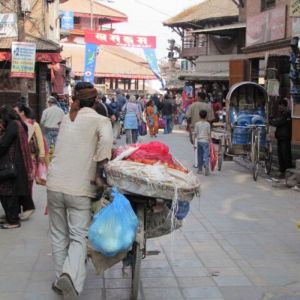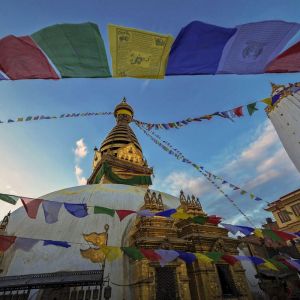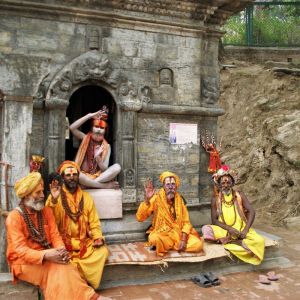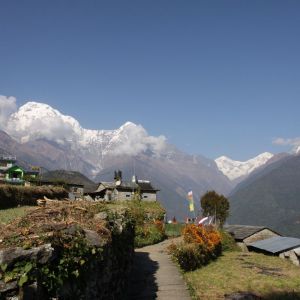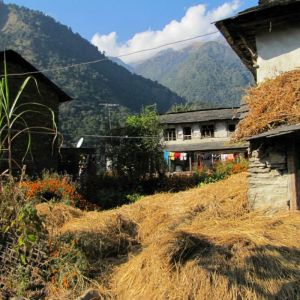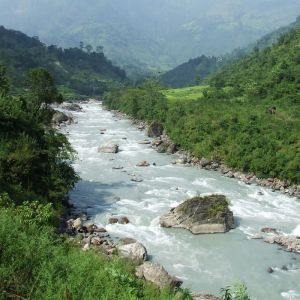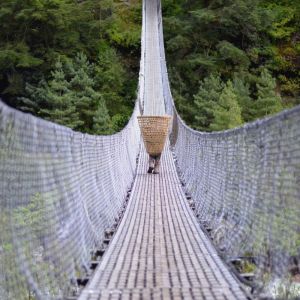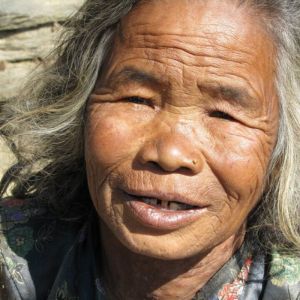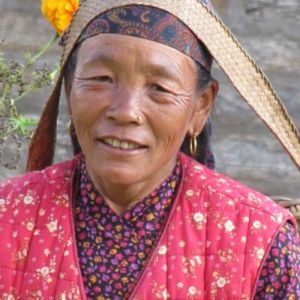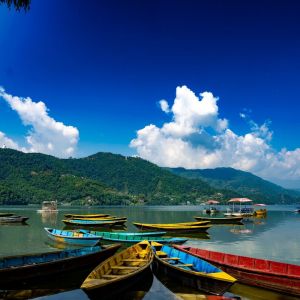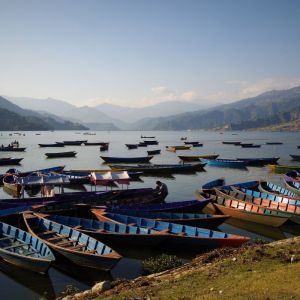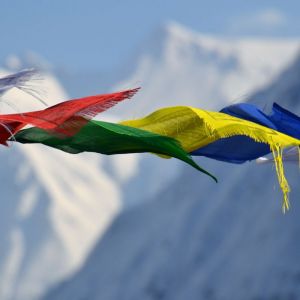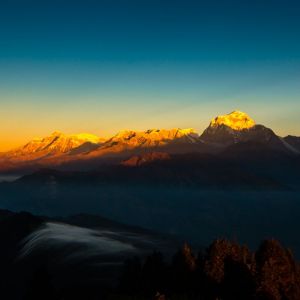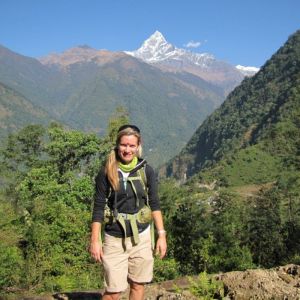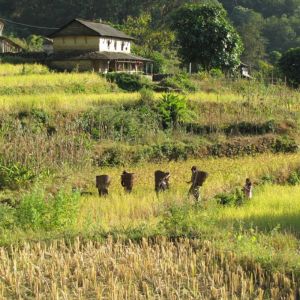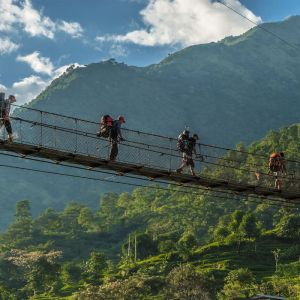- Overview
- Map & Itinerary
- Essential Info
- Pics & Vids
- Dates & Prices
Highlights
- Private trekking challenge for Team McKeown members only in support of Macmillan Cancer Support
- Unique itinerary carefully crafted to explore the stunning Annapurna Region
- Take the less trodden Khayer trail and marvel at some of the best panoramic vantage points in the Himalaya
- Journey into an area of traditional culture of the Annapurna Ranges
- Pass awe-inspiring glaciers, pristine rivers and wind through flourishing forests, isolated villages and mountain pastures
- Experience alpine mountain terrain trekking to the beautiful Khopra Danda (Kobra Ridge) at 3650m
- Enjoy the warm hospitality of the Nepalese people
- Wander the streets of the vibrant and colourful towns of Kathmandu and Pokhara.
Overview
A challenging yet awe-inspiring trek through the Annapurna region for members of Team McKeown only. This carefully created trip offers a window into traditional ancient culture and lifestyles of the Annapurna Ranges in the Himalayas.
Starting in the colourful and laid-back city of Pokhara, the gateway to the Annapurna ranges, your route traverses the ridge and valley landscapes on the south-western edge of the mighty Annapurna Massif offering awe-inspiring mountain panoramas.
Following the less trodden Khayer trail, your trek winds its way through charming rhododendron and magnolia forests, twists through the woodlands, passes remote mountain villages, lakes formed by the glaciers and icefalls before breaking through the treeline into alpine mountain terrain to the highest point of the trek – the unbelievably beautiful Khopra Danda (Kobra Ridge) at 3650m. The views are incredible framed by a whopping 23 Himalayan mountain peaks together with the sheer walls of the magnificent Dhaulagiri plunging to the misty depths of the Kali Gandaki – the deepest gorge in the world.
This trek is undoubtedly a heart-warming experience where perception and time subtly shift and one feels like a pioneer on a completely different planet.
A truly unique and humbling adventure in one of the most beautiful places on Earth.
Overnight flight from UK to Kathmandu Nepal
On arrival at Kathmandu Airport, you will be met and transferred to your hotel where you will meet your local Nepalese Guide. There will be a briefing of the trek ahead and your chance to ask any questions and make any last-minute preparations. The remainder of the day is at your leisure, or you can join an orientation walk around the inner part of the city through the back lanes and old market square (time permitting).
Included
Transfer: Private transfer
Accommodation: Kathmandu Guesthouse or similar (twin share basis)
Meals: Evening meal
KATHMANDU TO POKHARA
In the morning, take in the sights, sounds and stories of the highlights of the cultural capital of Nepal with your local guide. This includes visiting Bodhnath, the revered Buddhist pilgrimage site, supposedly the biggest ‘stupa’ in the world influenced by Tibetan form of Buddhism, and Pashupatinath, the holy Hindu temple dedicated to one of the Hindu trinity Gods.
Around noon you’ll be transferred to the airport (approx. 10 minutes) for a short and scenic flight to Pokhara (approx. 25 minutes). Later in the afternoon you will enjoy a boat trip across the picturesque Fewa Lake (approx. 25 minutes) to gain the grand scale of the impressive mountains surrounding you. To help with trek preparations, you’ll then ascend the hill through a forest to the impressively built World Peace Pagoda (approx. 1 hour). Here you can also behold the beautiful views of the Pokhara Valley, Fewa Lake and across to the Annapurna Range on the horizon. Descending via steps you’ll then take a short drive to your hotel (approx. 20 minutes).
Enjoy an evening meal in Pokhara’s lake district.
JOURNEY INFO
Flight time: 25 mins from Kathmandu to Pokhara (not included in package)
Included
Transfer: Private transfers
Accommodation: Hotel Barahi (twin share basis)
Meals: Breakfast and evening meal
POKHARA TO TADAPANI
Following breakfast, you’ll have a private transfer from Pokhara to Nayapul (approximately 1.5 hours), then into the Annapurna Conservation Area and further on to Kimche along rough roads however the spectacular scenery through Modi River Valley will provide the perfect distraction (1hr approx).
THE TREK
This is where your trekking adventure begins to Tadapani at an altitude of 2590m. Starting with a short uphill walk you will reach Ghandruk, (1940m), a popular and ornate ‘Gurung’ village which has grown large and prosperous on the pensions of retired Gurkha soldiers. You will be rewarded with dramatic views of the peaks of Annapurna South, Gangapurna, Hiunchuli and the all-sofamous Machhapuchhre. Following lunch at Ghandruk, your trek winds uphill for the most part of the afternoon passing through mountain forests and the views of Annapurna South and Hiunchuli become increasingly closer and even more impressive. Your first day of trekking finishes in the small village of Tadapani which is surrounded by impressive mountain forests. You will overnight in a traditional tea house.
JOURNEY INFO
Transfer time: Approx. 2.5 hours
Trekking time: Approx. 4 hours
Trekking ascent: 690m
Overnight altitude: 2590m
Included
Transfers: Private vehicle transfers
Accommodation: Teahouse
Meals: All meals
TREK TADAPANI TO BAYALIKHARKA
The perfect place to awaken this morning with the serenity of the Himalayan mountain landscape. As part of this unique trek you will veer off the popular Annapurna trail to experience the lesstrodden Khayer trail. The trail winds its way gently uphill through charming rhododendron and magnolia forests, with daphne bushes and orchids hosted by the larger trees. You will see stormtorn trees broken by the winter snows & wind before reaching a picturesque meadow complete with a small stream. Reaching a minor mountain pass, you continue through the rhododendron forest descending to a clearing in the midst of woodlands which is Bayalikharka at an altitude of 3450m.
TREKKING INFO
Trekking time: Approx. 6 hours
Trekking ascent: 860m
Overnight altitude: 3450m
Included
Accommodation: Teahouse
Meals: All meals
TREK BAYALIKHARKA TO UPPER CHISTIBUNG
This morning your trail descends and twists its way down through the woodlands to the stunning pasture at Lower Chistibung. Your trail then gradually ascends up a forested hill through meadows, to reach a makeshift herders’ settlement at Chistibung (2990m). If you’re lucky you might even spot the colorful Lophophorus (Danphe), the national bird of Nepal, as well as Himalayan Thar on the grassy ridge high above the trail.
TREKKING INFO
Trekking time: Approx. 3-4 hours
Overnight altitude: 2990m
Included
Accommodation: Teahouse
Meals: All meals
UPPER CHISTIBUNG TO KHOPRA DANDA
This morning involves a continuous climb breaking through the treeline into alpine mountain terrain. This marks the highest point of your trek at the unbelievably beautiful Khopra Danda (Kobra Ridge) at 3650m. Renowned to be “somewhere between Heaven & Earth”, the views from Kobra of Annapurna South (7219m) Baraha Shikhar (7647m) in the foreground and the peaks of the Nilgiri away towards Mustang and westward to the hulk of Dhaulagiri, where later the sun will set, are filled with the ultimate wow factor. This, plus the encounters with the friendly villagers, will make anyone want to come back again and again. Keep your eyes peeled to catch a glimpse of the Himalayan Tahr and the beautifully hued national bird of Nepal – the Danphe. For those who wish, there’s an optional hike to nearby hilltops.
TREKKING INFO
Trekking time: Approx. 5 hours
Trekking ascent: 660m
Overnight altitude: 3650m
Included
Accommodation: Teahouse
Meals: All meals
TREK KHOPRA DANDA TO SWANTA
Set your alarms early as you definitely don’t want to miss the spectacular sight of the sun’s first rays lighting up the Himalayan peaks. It’s a sunrise that you’ll treasure for a very long time to come. The trek then resumes with a steep descent through meadows to Chistibung, with a number of herder’s huts and dzo grazing (crossbred cow and yak). The path continues to descend through rhododendron and oak forests with more views of Mount Dhaulagiri providing a lovely backdrop to the terraced fields and traditional houses in the nearby villages. Finally you will reach the village of Swanta. If you wish, you can visit Swanta Primary school, a community supporter school where there are two teachers funded by the profits from the community lodges.
TREKKING INFO
Trekking time: Approx. 6 hours
Trekking ascent: -1455m
Overnight altitude: 2195m
Included
Accommodation: Teahouse
Meals: All meals
TREK SWANTA TO ULLERI
The morning starts with an undulating path to the village of Chitre passing through forest and hamlets. You will reach the famed village of Ghorepani for lunch and it is here you will re-join the popular Poonhill Trek route, giving you a sense of appreciation of your quieter days trekking the Khayer trail. Your path is a continuous descent on stone steps to Ulleri approx. 3.5 hours.
TREKKING INFO
Trekking time: Approx. 7 hours
Trekking ascent: -235m
Overnight altitude: 1960m
Included
Accommodation: Teahouse
Meals: All meals
ULLERI TO NAYAPUL AND TRANSFER TO POKHARA
This is your final day of trekking where the trail out of the Annapurna begins to level as you pass Birethanti and on to the roadhead at Nayapul. Here you’ll meet your private transport for the return drive back to Pokhara. Spending one night in Pokhara near the stunning Lake Phewa gives you the chance to relax or further explore the lakeside district of markets, visit the International Mountain Museum (time permitting) or just sit back and enjoy the spectacular scenery from one of the many restaurants or cafes.
TREKKING INFO
Trekking time: Approx. 4 hours
Transfer time: Approx. 2.5 hours
Trekking ascent: -890m
Overnight altitude: 800m
Included
Accommodation: Mount Kallash Resort or similar (twin share basis)
Meals: Breakfast and evening meal
POKHARA TO KATHMANDU
Today sees you depart the gateway to the Annapurna range as you take your return flight from Pokhara to Kathmandu filled with many found memories and great adventure stories. The remainder of the day is yours to experience, the sights, sounds and smells of Kathmandu. Whether you’re barrelling through the traffic-jammed alleyways of the old town in a rickshaw, marvelling at the medieval temples or purchasing some last-minute Nepalese souvenirs, Kathmandu can be an intoxicating and amazing place. You may wish to visit the UNESCO-listed Durbar Square in the heart of the old city where the old Royal Palace is located. Outside is Kumari Chowk, home of the Kumari, the young girl who is revered as a living goddess. Stroll through the backstreets and Kathmandu’s timeless cultural and artistic heritage still reveals itself in hidden temples overflowing with marigolds, courtyards full of drying chillies and rice, and tiny workshops. Or you may wish to visit the monkey temple at Swayambhunath, one of the largest Buddhist Stupas in the world at Bodnath, or the most important Hindu temple in the valley at Pashupatinath. Feel free to speak with your Nepalese Guide if you have any questions or need any directions.
JOURNEY INFO
Flight time: 25 minutes from Pokhara to Kathamndu (flight not included in package)
Included
Accommodation: Kathmandu Guesthouse or similar (twin share basis)
Meals: Breakfast and evening meal
Return flight from Kathmandu to UK
Transfer to Kathmandu Airport for your return flight home.
Please note, the itinerary is subject to minor changes depending on flight arrival and departure times, weather, the ability of the group, etc., but the itinerary outlined provides an excellent indication of the trek and what you will experience.
If you wish to extend your stay in Nepal, we can help you with plenty of recommendations of things to do and see. Simply get in touch to chat further about what you can do at info@adventurousewe.co.uk or call 01492 588 069.
Nepal has experienced more than it’s fair share of impacts over the past few years with devasting earthquakes, avalanches and COVID-19. We’re passionate about supporting the tourism industry to Nepal to help with it’s recovery, not just to the more frequented regions of Everest and Annapurna, but also to the less visited trails of Khayer trail. The tourism industry contributed about 6.7% to Nepal’s GDP, while its total impact was US$ 2.2 billion. In addition, in 2019, tourism supported over one million direct and indirect jobs, or 6.7% of total employment. Approximately 80% of these jobs are in the most remote and resource-constrained regions.
We develop and host sustainable adventures to help support local communities and give you the chance to have a more meaningful travel experience. This trek to the rarely visited area of Manaslu has been created in line with our Travelife Partner award in sustainable tourism.
Plus this trek is in support of Macmillan Cancer Support where your fundraising will go towards helping people affected by cancer.
On booking your Team McKeown Annapurna Explorer Trek, you’ll receive all the exciting trip info via our free mobile travel app.
You’ll have access to your itinerary, trip countdown, live updates, contact info, weather forecasts, know before you go trip info, kit lists and much more at the touch of a button 24 hours a day via your mobile phone. No more unnecessary use of reams of paper to benefit the environment and the need of carrying around documents with you. A’ppy days.
With being a small family business we pride ourselves with providing personal, professional and friendly service. We appreciate that everyone has different levels of experience and reasons for wishing to embark on this Annapurna Explorer Trek and therefore require varying levels of support and guidance.
We’re here to help you every step of the way from the moment you join the flock all the way through to completing the challenge and beyond. Jim and Sue’s knowledge and expertise stems from dozens of years of travelling and exploring the destinations that we visit in order to fully support you in the lead up to your adventure. They have both completed this classic mountain journey numerous times and are best place to help you with any questions, no matter how big or small.
International flights
Overnight flight from UK to Kathmandu, Nepal
International economy return flights from London to Kathamdnu are included in your package.
Internal flights in Nepal
For this trip there is a return internal flight between Kathmandu and Pokhara which is payable by you directly to our local operator in Nepal. Please note, the mountainous terrain is often subject to changeable weather which makes flying conditions complex. In addition, the Civil Aviation Authority (CAA) of Nepal does not operate to the same standards as those of western nations. The EU has recently chosen to highlight the relatively poor safety record in Nepal, and as of December 2013 all Nepalese registered airlines have been included on the EU ‘Banned list’ preventing them from flying in EU airspace. While no Nepalese registered airlines currently fly within the EU, the EU have instigated this ban to encourage the CAA of Nepal to tighten its systems governing Nepalese aviation.
Flying in Nepal
Flying within Nepal is therefore a known risk and the current travel advice issued by the UK Foreign & Commonwealth Office provides an overview which we encourage you to read. For emergency situations, we have an approved list of helicopter companies for our use through our local tour operator. Adventurous Ewe is supportive of the EU’s move to put pressure on the CAA of Nepal in this way. We are hopeful that this will make a difference to all who fly in Nepal. Please consider the information above when deciding to book this trek and the optional Everest scenic tour flight.
Flights between Kathmandu and Pokhara are often delayed due to poor weather and there have been occasions when groups have had to have their treks rescheduled. Your Leader will give you the most up to date information regarding flights. Please note, adverse weather conditions in Nepal may occasionally mean that your flight to Pokhara cannot operate and we may have to return to Pokhara by road. Adventurous Ewe has built in an additional back-up plan accommodate this.
Luggage Allowance
Domestic flights in Nepal have strict weight limits of 20kg of check-in luggage and 5kg of carry-on hand luggage per person which is included with your flight ticket. Excess baggage (up to 5kg per person only) will be charged and is payable at your own expense.
Nepal’s only international airport, Tribhuvan International Airport, has a single runway that services both domestic and international flights. Cancellations and delays are frequent, especially during peak tourist seasons or in poor weather. Travellers have on occasion missed international connections as a result of this, particularly if flights from Pokhara to Kathmandu are delayed. Ensure you have adequate travel insurance and contact numbers for your airlines before departure. Ultimately any prolonged delay of your return to Kathmandu may result in missing your international flight; in such circumstances, for those who have booked flights through our Flight Travel Agent, Adventurous Ewe will make every effort to rebook flight inclusive package participants onto the next available flight (in the appropriate booking class and with the same international carrier).
Land only participants should be aware that in these circumstances Adventurous Ewe cannot be held responsible for you missing onward travel arrangements.
Travel between Kathmandu and Pokhara
There is an alternative means of travelling to Pokhara by road as opposed to flying. It is a long overland journey of 200kms which takes approximately 6+ hours. Should you decide to travel via road transport, this will be at your own expense with no refunds for travel by road available.
Internal road transfers
Airport transfers and transfers too and from the start and finish of the trekking point will be via private minibus. All minibuses are fitted with seat belts.
Roadworks and infrastructure projects can cause delays on major roads within cities and highways between destinations. Road travel can also be disrupted due to demonstrations and bandhs (strikes) without warning. Major roadworks are currently ongoing in and around Kathmandu. Delays, traffic, poor road conditions and dust are a reality of road travel in Nepal.
All nationalities require a full passport that must be valid for 6 months beyond the intended length of stay. For the most up to date info, please visit the Foreign & Commonwealth Office website.
Most nationalities require a visa for Nepal, and we highly recommend that you secure your visa prior to travel to avoid any lengthy queues or unnecessary hassles. Applications can be made directly through the Nepal Embassy (by post or in person) by visiting https://uk.nepalembassy.gov.np/visa/. All Nepal tourist visas are multiple entry. The current cost for a visa in advance is GB£25 for a 15-day visa, GB£40 for a 30-day visa or GB£90 for a 100-day visa for UK passport holders (plus postage fees if applying by post).
On arrival in the immigration hall at Kathmandu there are 3 queues and if you have obtained your visa in advance you can go straight to (3) – immigration.
If you were unable to obtain your tourist visa in advance, you can avoid the queue for the first stage of the visa process on arrival at Kathmandu Airport by printing off the application form found online. Please complete this form before you travel and attach one passport sized photo. If you travel with this form you can then go directly to the cashier to pay for your visa.
Also, please visit the UK Foreign & Commonwealth Office website, or your respective nationality governing website, for the latest travel information on Nepal.
Travel Insurance is an important part of any booking. It is compulsory that everyone who travels with us has taken out adequate travel insurance which includes, among other things, cover for the full value of your trip, medical (emergency, evacuation and repatriation) arrangements, activities undertaken, personal liability, cancellation, curtailment and loss of luggage and personal effects and COVID-19 travel cover.
For UK residents we have partnered with Campbell & Irvine Direct to provide you with a travel insurance. If you would like to obtain cover for your trip please feel free to contact specialist Insurance Brokers, Campbell Irvine Direct for a quote.
You must send your Travel Insurance Policy to Adventurous Ewe no less than 8 weeks prior to departure.
Global Rescue Membership
For peace of mind whilst trekking in the mountains, Global Rescue provides short term membership giving access to travel, security, medical advisory and evacuation services up to $US500,000. They’re a specialised field rescue company, and assist from the point of illness or injury by getting you to the closest and most appropriate medical facilities to get stabilised. Once fit to fly if you require additional inpatient treatment Global Rescue will further evacuate and repatriate to your home hospital on record. These services are all covered through their upfront membership fee with no claims process. For more info, please click here.
For the most up to date info on vaccinations, please consult with your GP or travel healthcare practitioner 8 weeks in advance of travel. There are no mandatory vaccination requirements. Recommended vaccinations are: Polio, Tetanus, Diphtheria, Typhoid, Hepatitis A. For up to date vaccination information please check the NHS government website ‘Fit for Travel’.
Malaria
There is low to no risk of malaria throughout Nepal and antimalarial tablets are not usually advised although may be considered for certain higher risk groups; you may wish to consult your GP or travel health clinic for further advice. The risk is highest in the low lying southern ‘terai’ districts bordering India.
Yellow Fever
A yellow fever certificate is only required if travelling from a country with risk of yellow fever transmission or for travellers having transited for more than 12 hours through a country with risk of transmission.
Dengue fever is a known risk in Nepal. It is a tropical viral disease spread by mosquitoes. There is currently no vaccine or prophylaxis available for Dengue, and therefore the best form of prevention is to avoid being bitten. As of August 2019, there has been a recent outbreak of Dengue fever in southeast Nepal and we therefore recommend you take extra precautions to avoid mosquito bites (such as wearing full length trousers, long sleeves and applying insect repellent during the day as well as at dawn and dusk).
The hiking section of this itinerary travels at altitude where there is a risk of being affected by Acute Mountain Sickness. Our itinerary is designed to enable you to acclimatise to these altitudes, but you should be aware that it is still possible for you to be affected.
Severe allergies
If you have a severe allergy please inform us at the time of booking. We will do all we can to help, but unfortunately we are unable to guarantee an allergy free environment on this trip. You will need to carry your own treatment for the allergy with you, as ‘adrenaline auto-injectors’ are not carried as standard by AE leaders and crew. Whilst your leader is aware of our trekkers medical history, please also inform your leader on arrival of your allergy, and let them know where you keep your adrenaline pen.
Adventurous Ewe puts the safety and well-being of you, our leaders & crew and the communities we visit at the centre of all our operations, always. Your safety and well-being is our top priority.
The Annapurna Explorer Trek is intentionally challenging and requires individual preparation as the trip is designed to take you out of your every-day comfort zone and achieve something amazing. Rest assured we have a thorough Safety Management System, indepth risk assessments and risk management systems in place.
Support
You will be accompanied by local qualified Mountain Guide/s and a UK High Altitude Mountain Leader for groups over 8 people. All our Guides are Remote First Aid trained and have extensive experience in leading teams in this region. They will be ultimately responsible for your safety on this trip.There will be radio or phone contact between Adventurous Ewe Mountain Leader, Local Leaders & crew and the Office Base in Kathmandu during your trek. Your Mountain Leader will also carry a Satellite phone for emergencies only and have 24-hour contact with Adventurous Ewe office in UK. In the unlikely event evacuation be required the National Park rescue service. All staff are highly trained with the evacuation procedures. A member of our staff will be carrying medical supplies should it be required.
If for any reason you need to leave the group early and come off the mountains, Sherpas will assist you with your descent and will arrange transfers, accommodation and medical care if necessary. All costs incurred due to an early descent will need to be covered by yourself before departing the hotel, this is why we insist on suitable travel insurance cover.
Many national governments provide a regularly updated advice service on safety issues involved with international travel. We recommend that you check the Foreign & Commonwealth Office Travel advice website for their latest travel information before departure and ensure that your travel insurance covers you for all areas your itinerary covers.
We also ask that you please ensure you use your alcohol-based hand sanitiser at all times to minimise the spread of any germs throughout your fellow flock of trekkers!
UK Guide
Your UK Mountain Leader will have many years leading teams in Nepal and be an experienced altitude guide. Our Leaders are carefully selected to ensure you have the best experience on your trek and with a bit of humour thrown in for good measure. Your UK Mountain Leader will also have Remote First Aid qualifications.
Local Guides
Our Local Guides are very experienced, knowledgeable and have the renowed warmth and hospitality of the Sherpa people. They are constantly self-driven to go above and beyond to ensure you will have an amazing experience. Mountain climbing for the local guides is more than just a career, it’s a passion which they are proud to share with others. Our Guides are responsible for ensuring the complete safety, well-being and enjoyment of the team whilst also retaining a flexible and supportive attitude. The Leaders/s have satellite phone, radio and mobile phone contact with base, the local office in Kathmandu and Adventurous Ewe’s HQ.
Porters welfare
We understand porters, and the whole mountain crew in general, are the heart and soul of our Annapurna trek and we believe that fair treatment of our crew on the mountain is not merely an industry requirement but the tenet of every Annapurna expedition. Ensuring our crew is well paid, insured and cared for is a priority for us. When we trek, the entire group ‑ you, the guides and porters alike ‑ are a team who share the same needs for safety and well-being in this mountain environment.
We pride ourselves in small group travel to minimise the impact on the environment, to maximise your safety and wellbeing and to make your experience more authentic.
The minimum group size for the Annapurna Explorer Trek to run is 10 people and the maximum group size is 18 people.
The Annapurna Explorer Trek is graded as ‘Tough’ as it involves 7 consecutive days of trekking some of which is at altitude. However, it is achievable and has been designed as an ideal introductory itinerary to trekking in the Himalayas. The maximum altitude is 3650m at Khopra Danda (Kobra Ridge) and we recommend this trek to those who want a thorough overview of the Nepalese Himalaya. The hiking is mostly on well-established trails. The route crosses numerous modern suspension bridges over rivers and valleys; all have mesh sides and none are especially high. Anyone with a strong fear of heights or vertigo may find the bridge crossings a challenge though the guides will give you additional support.
Please also be prepared for varied conditions and temperatures especially as you ascend higher into the Annapurna region. You are likely to be cold, washing facilities are minimal and the loos are different from the luxuries at home. Though please remember that everyone on your trek will be experiencing the same and as a team pursuit, we encourage strong teamwork and support.
To complete this trip comfortably, it is preferable that you have previous trekking experience in varied and irregular terrain carrying a 35-litre daypack. The walking is not dangerous or technically difficult, though you must be a confident walker with a good
Preparation is key to help you get the most enjoyment and reward from this trek. A good level of fitness, endurance and some gritty determination will help you conquer each day.
When you ascend above 2500 metres your body has to acclimatise to the decreasing amount of the oxygen available. To allow your body to adjust we have structured this trek so that you ascend slowly, allowing acclimatisation to occur. However, during the acclimatisation process, you may experience some of the following symptoms – headaches, tiredness, disturbed sleep, shortness of breath, cough, loss of appetite, nausea, palpitations and swelling of the hands and face.
Individuals acclimatise at different rates and we would expect the majority of the team to notice the effects of being at high altitude, and while most will only feel discomfort and headaches, it is not uncommon for a small number of people to need extra care which will be provided by our leaders and crew.
During your pre-trek briefing, altitude sickness will be discussed in more detail and advice on how to best cope with it. The most important thing is not to fear it, but to respect it. Know the signs & symptoms of AMS (Acute Mountain Sickness), be aware of how it affects the body and report any illness to your leader straight away. Our leaders and crew are there to help and are fully experienced with high altitude conditions and all the scenarios that trekking at these altitudes bring. You’re in good hands.
In most cases, AMS can be avoided following these guidelines:
- Drink around 3-5 litres each day to achieve suitable hydration levels. Try and avoid tea & coffee and definitely no alcohol
- Walk slowly, even when in the teahouses
- Keep warm, especially at night
- Eat well, even when you don’t feel like eating
All our trips that spend time at altitude follow our standard altitude safety measures. A number of medical conditions or medications can also reduce your body’s ability to acclimatise, and thus will affect your performance at altitude and make you more susceptible to AMS. If you are worried about any pre-existing condition (e.g. heart problems), or unsure of your physical ability, you must seek medical advice prior to booking.
Please note that while we endeavour to assist you with achieving your personal goals, however there may be times when your leader makes the decision to either delay or stop your ascent based on your medical conditions and AMS symptoms. Please respect this decision for it is for your own safety and welfare.
A Trek Training Programme will be provided when you join this event to help you with your preparations. We also have exclusive offers with our Training Partners and Communities – Her Spirit and Strength & Movement Coast, Peter Lant. For more info, please visit our Training & Preparation page.
The more you are prepared, the more you will enjoy the challenge.
Our motto is: Train hard, smile harder and enjoy the journey!
A full kit list will be provided when you register for this trip or you can download the Trip Notes for this trek. Good kit can make the difference between a fantastic adventure and an uncomfortable one. Well worn in waterproof hiking boots are essential together with a good quality waterproof jacket AND trousers. An exclusive Adventurous Ewe discount code will be provided for the independent outdoor retailers on booking this trip.
To help you get the very best from your Annapurna Explorer Trek we will provide you with an exclusive Adventurous Ewe discount code to use in independent retailers both online and in store. They offer a large choice of kit that the staff themselves use while climbing, hiking, mountaineering, running, travelling or enjoying expeditions across the globe and they pride themselves on sharing their experience and knowledge of equipment so you can choose the right gear to suit you and this mountain trek.
The main trekking season in Nepal is from October to mid-May when daytime temperatures at most altitudes are generally comfortable for trekking, the sky is predominantly clear and rain & snow occur occasionally. Daytime temperatures will vary from 15ºC to 35ºC in the Kathmandu Valley to around 10ºC at 3,600m.
Different seasons offer different advantages for trekking.
Post Monsoon/autumn: Mid-September to November.
This is the main trekking season in Nepal. Day temperatures in Kathmandu are approximately above 20ºC. Skies are usually clear and days on trek are sunny and mild with clear mountain views. Nights will be colder with temperatures dropping as low as to minus 10ºC at the highest altitudes.
Winter: December to end February.
Despite the cooler conditions this is an ideal time to trek in Nepal. Skies are usually very clear especially in December and the mountain views are at their best. Nights will be very cold with temperatures down to minus 15ºC to minus 20ºC at the highest altitudes but days are pleasant and sunny. The trails are also much less busy at this time of year. In Kathmandu maximum daytime temperatures are 19ºC.
Pre-monsoon/spring: March to May.
Both day and night temperatures will be warmer in general but often a haze will build up in the afternoons. It is very hot in the lowlands and temperatures rise to 35ºC in Kathmandu. Flowers bloom in this season and this is one of the reasons people chose to trek in Spring.
Please remember that in any mountain area the weather is never predictable. You should be prepared and equipped to deal with any differences in weather beyond the conditions described above.
We recommend that you check the mountain weather forecast in the days leading up to your trek by clicking here.
10 nights: Hotel (4 nights), teahouses (6 nights)
In Kathmandu we usually stay at the Kathmandu Guesthouse, a 3-star hotel located within the Thamel district and 18 minutes’ walk from Kathmandu Durbar Square, a royal palace complex. All rooms have ensuite facilities and there is a restaurant, a bar and an outdoor courtyard. There is complimentary Wi-Fi in the hotel lobby and Wi-Fi throughout.
The teahouses are basic but adequate; please be realistic about what to expect in the mountains. The hub of the teahouse is the dining room, which is generally a heated area via stoves and often attractively decorated. Most teahouses sell snacks and other essentials such as tissues, soap and toilet paper. Almost all lodges have electricity but it is not wholly reliable and lighting may not be bright enough to read by – a head torch is essential. Electrical charging facilities are generally available only in the dining room (charged at approx. Rs150-350 per hour per device). Many of the lodges use solar power so sometimes there is not enough electricity for charging.
You will usually stay in twin-share bedrooms throughout this trek. Beds with foam mattresses, bedsheets and a pillow are provided. Bedrooms are unheated and get cold at night so a sleeping bag is essential. Most teahouses have only one or two basic toilets and sometimes these are located outside the main lodge building. Toilets are usually Asian ’squat’ style; although many lodges have now installed ‘western style’ seated ones. Toilet paper is not provided so you should bring your own or buy it locally. Some lodges now have hot ‘showers’ (charged at approx. Rs250-500 per shower).
Standards of cleanliness vary especially in the peak trekking season and in winter when the water freezes at night. Please report any problems to your leader or the lodge and be vigilant in your personal hygiene regime at all times. As a general rule, the higher altitude you go to, the more basic the lodges and the more expensive food and services become.
For more info or to request a single room, please get in touch with us at info@adventurousewe.co.uk.
There are 3 breakfasts included in this trip whilst staying at the hotel. Lunch and dinner is not included in your itinerary given you the flexibility to order what meals you wish be it local foods or more western style meals where available. It also ensures the trip is supporting local businesses in the region. Rest assured we will provide recommendations of where to eat based on health and hygiene factors.
In the teahouses breakfast typically comprises of a choice of bread (a slice of toast, chapatti or Tibetan bread), eggs, and a choice between either muesli or porridge. Hot tea/coffee will also be served. On specific days, there will not be a choice for breakfast and either a trekkers breakfast (egg, hash brown, baked beans and toast) or a pancake with jam/honey will be served – these options are not available in all teahouses.
Lunch will be taken at a teahouse enroute – sometimes one of your guides will go ahead with the group’s order to make it more efficient. Dinner will be in the same teahouse that you overnight in (this is custom in Nepal). Although most lodges have almost identical menus, they are reasonably extensive and offer a varied selection, ranging from traditional Nepalese dhal baht to pizza. Another popular snack is momos; a type of Nepalese dumpling. Although meat is available in the teahouses, we advise against eating it on trek.
If you wish to order additional dishes and/or snacks, you should budget accordingly. Boiled drinking water will be provided at breakfast, lunch and dinner. All the lodges and teahouses sell snacks, chocolate bars, soft drinks and beer.
Whilst the teahouses can cater for vegetarians, albeit sometimes with a more limited choice, if you have a gluten free diet or vegan, then we strongly recommend you bring some extra food and snacks with you to supplement the food on trek. Unfortunately there will be a limited variety available for you given the nature of the trip and being in Nepal, it can be very hard (and sometimes impossible) to cater for a wide range of dietary choices and you will have to supplement your diet with food/snacks from home. If you have specific dietary requirements please do get in touch and we can further discuss the options available to you.
In Kathmandu your evening meals will be at the hotel and local restaurants.
Water
Staying hydrated is important when undertaking any physical activity but particularly so at altitude where it is generally recommended to drink at least 3-4 litres per person per day. We strongly encourage you not to buy bottled water on trek as this contributes to the growing problem of plastic pollution in Nepal.
The teahouses sell boiled water for approx. Rs150-300 per litre (the price increases the higher you trek) which should not require treating. This is also perfect for a bedtime refill as it can double up as a hot water bottle. It is not recommended to drink untreated water from the taps or streams enroute. Adventurous Ewe has partnered with Water-to-Go, a filtration system that eliminates over 99.99% of all microbiological contaminants from any non-salt water source – for more info please click here. Adventurous Ewe trekkers will receive a free Water-to-Go bottle when departing for our Annapurna trek, and better still, 15% of the purchase value for replacement filters will be donated to our environmental charity partner, Cool Earth. Please note that if the water freezes it will clog up the filter – in this event, defrost before use by sitting the filter in lukewarm water for 10-15 minutes. Please help us reduce the volume of single use plastic in this pristine environment.
Adventurous Ewe has partnered with Water-to-Go, a filtration system that eliminates over 99.99% of all microbiological contaminants from any non-salt water source – for more info please click here. Adventurous Ewe trekkers will receive a free Water-to-Go bottle when departing on our Annapurna Explorer Trek, and better still, 15% of the purchase value for replacement filters will be donated to our environmental charity partner, Cool Earth. Please note that if the water freezes it will clog up the filter – in this event, defrost before use by sitting the filter in lukewarm water for 10-15 minutes. Please help us reduce the volume of single use plastic in this pristine environment.
Sponsorship: £5,000 minimum sponsorship for Macmillan Cancer Support (80% due 6 weeks before challenge departure date). Please note, any cancellations made after 20 September 2024, will result in participants having to pay 100% of the balance of their trip. Macmillan will provide you with fundraising support and guidance.
Book & Travel with Confidence
As well as carefully crafting amazing and meaningful adventures across the planet, we’ve made booking them as flexible, safe and as simple as possible.
For the latest info regarding booking and travelling with Adventurous Ewe, please visit our website.
All your trip info will be sent to you through a mobile travel app which is free to download. You will receive an email from Adventurous Ewe with your personalised log in code for this app.
For the latest and greatest from the land of adventures, simply follow us at:
Facebook: @adventurousewe
Instagram: @adventurousewe
Twitter: @adventurousewe
Youtube: Adventurous Ewe
LinkedIn: Adventurous-Ewe-Ltd
You’re most welcome to use the hashtags
#ewecandoit #thisflockrock #adventurousewe
Your Adventurous Ewe Leader/s and Crew will have a satellite phone, mobile phones and radios communications in case of emergencies. The team are trained to deal with these situations. Please ensure you listen to your Leader during these times and refrain from putting any posts on social media. Should you find yourself unable to continue with the trek, your Leader and crew will make the necessary arrangements. Depending on the situation, you will be met by the support vehicle (depending on access) and you will be transferred back to suitable accommodation or nearby medical facility as required.
Your Emergency Contact at Adventurous Ewe HQ is Jim Young on +44(0)7747 346 588.
Cool Earth
We are very excited to have teamed up with leading climate change charity Cool Earth, who share our mission to protect the planet’s precious environment in a sustainable manner. The future of rainforest protection is where everyone makes a difference to climate change! We invest a % of our revenue into supporting critical conservation projects around the world through Cool Earth. You are most welcome to help make a difference too by sparing a few pennies. Please give what you can and help save the world’s rainforests today by clicking here. Just £2.50 will save 10 trees and lock up 10 tonnes of CO2.
Together, we can all make a difference in helping preserve this precious and wonderful planet. Thank-ewe
| Departure & Return | Duration | Availability | Deposit | Total Cost* | (*Total cost includes the deposit) |
What's Included?
Pre-trip:
- Personalised trip support in the lead up to your trek
- Trek training guide
- Discount on personal kit from specialist independent outdoor retailers both in shop and online
- Trip info supplied via our free mobile travel app
- Public liability insurance
- Financial Protection for your booking
- Risk assessment and emergency management planning
- Free Adventurous Ewe Water-to-Go Bottle
During your trip:
- Return economy flights to Kathmandu Nepal
- Adventurous Ewe Leader
- Qualified & experience Local Mountain Guide
- All ground crew as per your itinerary
- Private transfers per your itinerary: Group airport transfers (bus); sightseeing tour in Kathmandu (bus); World Peace Pagoda – Hotel in Pokhara (bus); Pokhara – Kimche (Trek start point) (jeeps); Hille (Trek end point) – Pokhara (jeeps)
- Accommodation 2 nights in Kathmandu Guest House (Deluxe rooms) inclusive of breakfast; 2 nights in Hotel Barahi in Pokhara (Deluxe rooms) inclusive of breakfast; 6 nightson the trek in basic teahouses inclusive of breakfast, lunch & dinner
- Activities/tours/visits: Guided tour of Bodhnath & Pashupatinath in Kathmandu; Boating + Hike to World Peace Pagoda in Pokhara
- Entry fees/permits: Bodhnath, Pashupatinath, Annapurna Conservation Area fee, Trekking permit
- Drinking water during your trek (treated water, not bottled water)
- Medical safety equipment and supplies
- All logistical and safety management whilst in Nepal
- All trip management before, during and post trek.
What's Not Included?
- Travel insurance (mandatory)
- Internal flight from Kathmandu to Pokhara and return (US$220-240; exact cost can be ascertained at the time of booking)
- Visa – please refer to: https://www.gov.uk/foreign-travel-advice/nepal
- Vaccination/s. Please refer to: https://www.fitfortravel.nhs.uk/destinations/asia-east/nepal
- Personal spending money and drinks
- Meals not listed in your itinerary
- Snacks, electrolytes, water purification tablets
- Charges levied by teahouses for hot shower, battery charging (depending on the region USD 3 – 5; higher you go, more expensive it gets)
- Kit and equipment as listed on your kit list and medication
- Tips for local crew and local restaurants
- Single room supplement where available
- Any associated costs with leaving the trek early.
TRIP EXTENSIONS
If you wish to extend your stay in Nepal, we can help you with plenty of recommendations of things to do and see. For more information, please contact us at info@adventurousewe.co.uk.
Sustainable and Responsible Travel
Adventurous Ewe is committed to delivering all our trips in a responsible and ethical manner with sustainability at its core. We respect and continuously strive to operate our adventures to benefit local people, their economy and the environment!
Some of the ethical features embedded in our Annapurna Explorer Trek are:
- Using local crew who are qualified Leaders, support crew and drivers who are all extremely knowledgeable and experienced and armed with a big friendly smile
- Fair wages and ethical treatment of porters and guides
- Staying in smaller-scale locally owned accommodation
- Buying locally produced food and drink, and dining in locally owned restaurants
- Minimising plastic waste wherever possible
- Careful management of limited energy and water resources
- Offering real life experiences which promote cross-cultural understanding
- Respect the local people and their property. Do not take photos without introducing yourself and ask permission before snapping away
- Nepal is a conservative country therefore women should have their legs and shoulders covered and men should wear full-length trousers and tops with long sleeves.
- When visiting ancient and sacred sites don’t climb on ruins, avoid touching any religious object, and when you walk around monuments and temples, do so in a clockwise direction, that is – keep the monument on your right. It is generally not a problem to enter temples, but take your shoes off when you do and don’t take photos while you’re in there
- The litter problem in Nepal is growing and has increased with the wider availability of pre-packaged goods. Keep your waste to a minimum – avoid accepting plastic bags from shops and take a reusable bag with you. You are welcome to bring a rubbish bag on your trek, so you can pick up any additional litter you might spot and take particularly harmful waste, such as batteries, back to Kathmandu with you.
- Operating with a ‘leave no trace’ ethos – take only memories, leave only footprints
- Adventurous Ewe will make a financial contribution to the environmental charity, Cool Earth, as part of our partner-sheep.
 Difficulty
Difficulty
